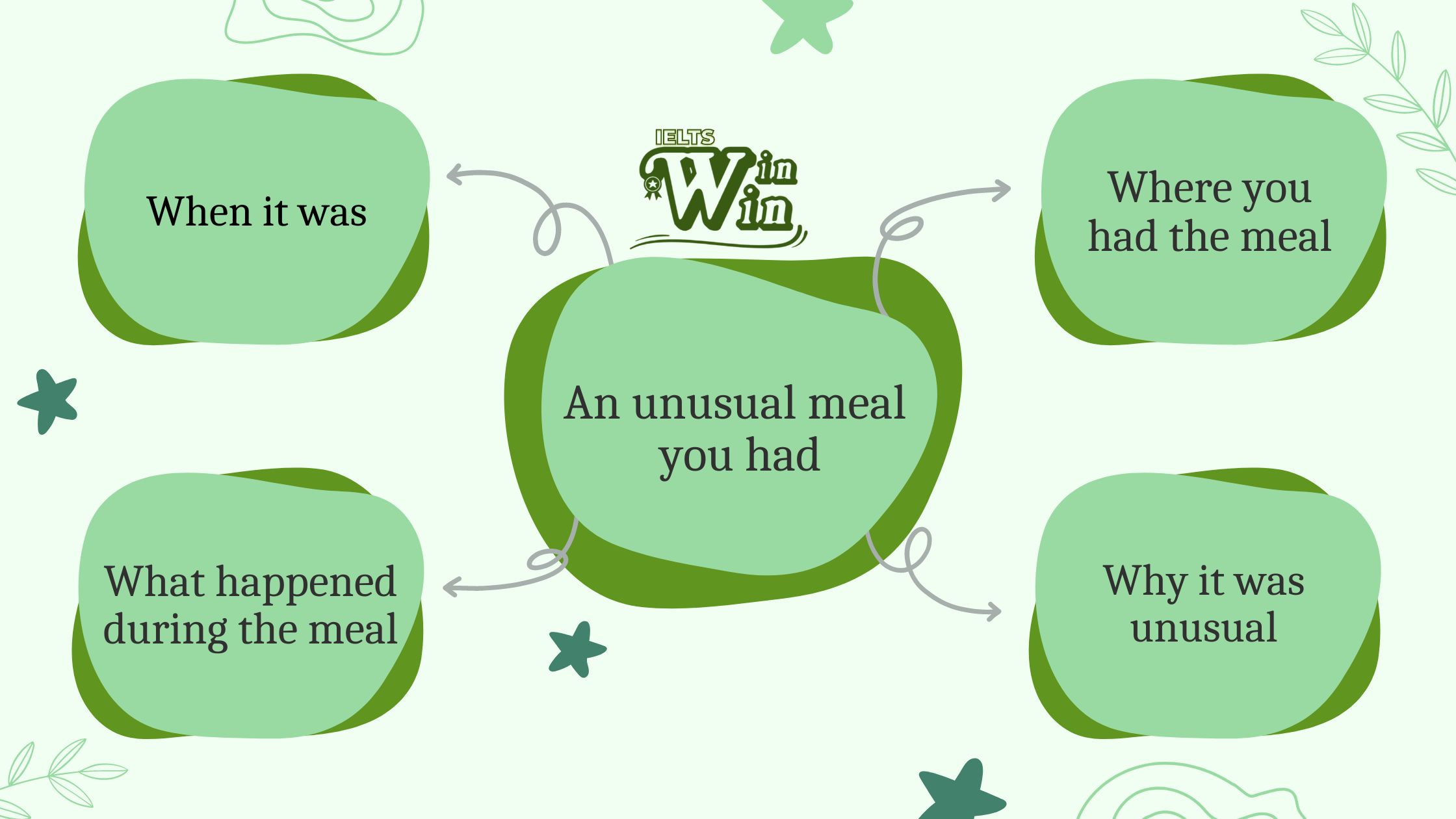✨Part 2: Describe an unusual meal you had.
You should say:
- when it was
- where you had the meal
- what happened during the meal
- and explain why it was unusual
I had a pretty unusual meal when I was studying in Australia for a short term. One of my Australian friends invited me over to her house for dinner and I was excited to try the local delicacies. However, the meal turned out to be pretty strange because there was this weird dish that I had never tried before.
I wanted to help my friend with the meal prep but she insisted I relax and enjoy the meal later. I knew that in Western culture, people start their meal with an appetiser but the Australian one was quite a strange experience for me. As we sat down to dine, my friend placed a basket of bread on the table along with a small bowl of jam. The jam had a distinct smell of yeast extract that was pungent and suspiciously dark. Without much thought, I grabbed some bread and spread the jam on it. When I took the first bite, I couldn’t help but frown as it was neither sweet nor fruity. Instead, it was oddly salty and sour at the same time, and I couldn't bring myself to take another bite. It turned out to be Vegemite, a well-known Australian food. Although I was keen to try all the authentic Australian delicacies, Vegemite didn't make it to my list of must-try foods. Unfortunately, it spoiled my appetite for the rest of the night, and I couldn't enjoy the other dishes as much as I usually would.
I don't intend to insult any national food, but Vegemite was not to my liking. My friend felt sorry for my experience with Vegemite and promised to make up for it by cooking another meal. In return, I invited her to my apartment for some Vietnamese food.
- Unusual: /ʌnˈjuːʒuəl/ (adj) - không bình thường, lạ thường
- Delicacies: /ˈdelɪkəsiːz/ (n) - món ăn ngon, đặc sản
- Appetiser: /ˈæpətaɪzər/ (n) - món khai vị, món ăn nhẹ
- Distinct: /dɪˈstɪŋkt/ (adj) - riêng biệt, khác biệt
- Yeast: /jiːst/ (n) - men bia, men nở
- Suspiciously: /səˈspɪʃəsli/ (adv) - một cách đáng ngờ, một cách nghi ngờ
- Frown: /fraʊn/ (v) - nhăn mặt, cau mày
- Spoiled my appetite: (idiom) - làm mất ngon miệng, làm giảm cảm giác ngon miệng
PART 3
✨Do you think having dinner at home is a good idea?
Cooking meals at home is a great way to save money compared to eating out. You can buy groceries in bulk and prepare meals for multiple days at once, making it much more cost-effective. Also, cooking at home allows us to make healthier choices by giving us more control over what we eat. We can avoid excess salt, sugar, and fat and create meals that fit our dietary needs. On top of that, having dinner at home is the opportunity to connect and spend quality time with family members or roommates.
- Buy sth in bulk: (idiom) - mua hàng với số lượng lớn
- Excess: /ˈeksəs/ (n) - sự thừa, sự dư thừa
- Dietary: /ˈdaɪəteri/ (adj) - thuộc chế độ ăn uống
✨Why do you think some people choose to be vegetarians?
Going veggie has been proven to be way healthier and more nutritious than sticking to meat. Many folks choose to go full plant-based to cut down the risk of health problems like heart disease or high blood pressure, which are more common among meat-eaters. Plus, some people just can't stomach the thought of killing animals for food, and think it's way more ethical to skip animal products altogether. And let's not forget that some religious or cultural beliefs can also play a role in a person's decision to adopt a vegetarian lifestyle.
- Nutritious: /nʊˈtrɪʃəs/ (adj) - bổ dưỡng, giàu dinh dưỡng
- Plant-based: /plænt beɪst/ (adj) - dựa trên thực vật, ăn chay
- Stomach the thought: (idiom) - chấp nhận, chịu đựng suy nghĩ về điều gì đó
- Ethical: /ˈeθɪkl/ (adj) - đạo đức, đạo đức học
✨What do you think are the benefits of having dinner together?
The biggest benefit of having dinner together as a family or with friends is strengthening relationships. During the meal, everyone can share their stories and connect with each other through face-to-face interactions after a long day of studying or working. Another benefit that may be overlooked is that when we eat alone, we are more likely to opt for fast or processed foods for convenience, which are often less nutritious. However, when we eat together, we are encouraged to prepare and consume meals that are more balanced and healthy.
- Face-to-face interactions: /feɪs tə feɪs ˌɪntərˈækʃənz/ (n) - giao tiếp trực tiếp, gặp gỡ trực tiếp
- Overlooked: /ˌoʊvərˈlʊkt/ (adj) - bị bỏ qua, không được chú ý
- To opt: /ɑpt/ (v) - lựa chọn, quyết định
✨Is the food that people eat today different to the food that people used to eat in the past?
Certainly, there have been significant changes in the food that people eat today compared to the past. Back then, people had fewer food choices and often relied on locally sourced or home-grown ingredients such as vegetables or livestock raised on small farms. Nowadays, much of the food we eat is highly processed or canned, which is often more convenient but can be less healthy. Thanks to globalization, we have access to a wider variety of foods from all over the world. This has opened up new opportunities to try exotic flavours and ingredients that were once rare or inaccessible.
- Processed: /ˈprɑːsesd/ (adj) - được chế biến, được xử lý
- Globalization: /ˌɡloʊbləˈzeɪʃən/ (n) - toàn cầu hóa
- Exotic: /ɪɡˈzɑːtɪk/ (adj) - kỳ lạ, lạ thường
- Inaccessible: /ˌɪnækˈsesəbl/ (adj) - không thể tiếp cận được, không thể đến được
✨Do you think people are less willing to cook meals by themselves these days, compared to the past?
Back in the day, people had more time and fewer options for eating out, so whipping up a home-cooked meal was the norm. Today, many people are caught up in the daily rat race and find it difficult to prioritize meal preparation and spend less time cooking for themselves. Most people find it hard to carve time out of their hectic schedule to stay in the kitchen and spend the effort to make a meal. Plus, there are so many fast food and takeout options that it's just easier to grab something on the go, which is definitely more appealing than spending time cooking from scratch.
- Whipping up: (phrasal verb) - trộn đều, đánh đều
- Rat race: /ˈræt reɪs/ (n) - cuộc đua đua nhau kiếm tiền, cuộc sống đua đòi
- Carve time out of their hectic schedule: (idiom) - tìm được thời gian trong lịch trình bận rộn
- Appealing: /əˈpiːlɪŋ/ (adj) - hấp dẫn, lôi cuốn
- From scratch: (idiom) - từ đầu, bắt đầu từ con số không
Xem thêm các bài viết về Speaking Part 2 và 3 ở đây bạn nhé
Đừng ngần ngại để lại thông tin hoặc liên hệ với chúng mình qua địa chỉ sau đây để IELTS WinWin có thể hỗ trợ tốt nhất cho bạn nhé!
Địa chỉ: 118 Nguyễn Xuân Khoát, P. Tân Thành, Q. Tân Phú, TP. Hồ Chí Minh.
Fanpage: IELTS WinWin
Zalo: 0965 439 239 – 085 301 8788
Website: ieltswinwin.com



